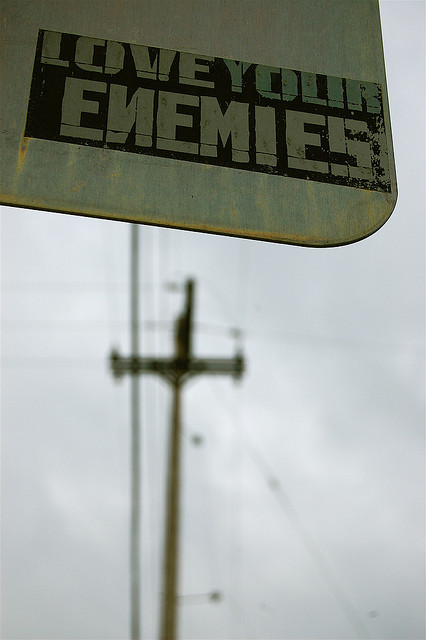We run our website the way we wished the whole internet worked: we provide high quality original content with no ads. We are funded solely by your direct support. Please consider supporting this project.
Blessing the Soldiers of ISIS
In light of the overwhelming response to Greg’s post about loving the soldiers of ISIS, we thought we would explore Jesus’ teaching on this topic further. The following is an excerpt from Myth of a Christian Religion. The perspective below stands in contrast to the perspectives exhibited by many Christians, one being the recent article written by Gary Cass.
__________
Not only are Kingdom people forbidden to respond in kind to their aggressors [for more on this see this post on “turning the other cheek”], we’re commanded to love and serve them. In contrast to the “holy war” tradition of the Old Testament, in which Israelites were at times commanded to kill enemies, Jesus taught, “Love your enemies, do good to them who hate you, bless those who curse you, pray for those who mistreat you” (Luke 6:27-28).
Note that loving our enemies, according to Jesus, entails doing them good. It is important that we understand this because there’s a long and sad Church tradition, dating back to Augustine, that divorces one’s loving disposition toward an enemy from one’s actions. This allowed Christians to torture and kill their enemies while claiming to love them.
In reality, Jesus doesn’t leave open this possibility. Just as God demonstrated his love toward us by acting in self-sacrificial ways to bless us, so we are to demonstrate our love toward even our enemies by acting in self-sacrificial ways toward them—to “bless them.” By “love your enemies,” Jesus means we must do good to them. …
Augustine speculated that Jesus’ decision to suffer unjustly rather than use coercive force was not intended to be a permanent example for all Christians to follow. Rather, he reasoned, Jesus had to suffer and die unjustly because he was the Savior, and his suffering and death were necessary for us to be freed from the devil and reconciled to God. Now that this has been accomplished, thought Augustine, and now that God (allegedly) had given Christians the power of the sword, it was not only permissible for Christians to use violence when the cause was “just,” they had a responsibility before God to do so.
This was the beginning of what’s called the “just war” tradition within Christendom.
Whatever one thinks of the just war theory as applied to secular governments, it has no place in the life of Jesus’ followers. For contrary to Augustine, the New Testament is as clear as it can be that Kingdom people are called to follow Jesus’ example of suffering unjustly rather than resorting to violence.
Paul commands us to “follow God’s example” and to “walk in the way of love, just as Christ loved us and gave himself up for us” (Eph 5:2)—while we were yet enemies of God. Peter encourages us to be willing to suffer injustice out of “reverent fear of God,” for “it is commendable if you bear up under the pain of unjust suffering because you are conscious of God” (1 Peter 2:19). And our model in this is Jesus himself. When people “hurled their insults at him,” Peter continues, “he did not retaliate; when he suffered, he made no threats” (2:23). Instead, Peter says, “He entrusted himself to him who judges justly.”
Peter further encourages people facing persecution to “revere Christ as Lord” in “their hearts” by responding to their persecutors with “gentleness and respect” (3:14-15). Following the example of Christ who “suffered once for sins, the righteous for the unrighteous, to bring [them] to God,” followers of Jesus are to maintain a gentle, loving attitude so that “those who speak maliciously against [their] good behavior in Christ may be ashamed of their slander” (3:17). Our willingness to suffer serves our enemies, for…it opens the door that they will be convicted and change their ways. (97-99)
If you want to explore this further, view the Q & A entitled Spiritual Warfare and Holy War.
Category: General
Tags: Augustine, Enemy Love, Holy War, ISIS, Love Your Enemies, Non-Violence
Related Reading

Believing the Best About Political Opponents
The surprising election of Donald Trump to President of the United Stated has exposed a profound, anger-filled divide running through the center of the American population. I would like to speak to the many Christians who are on the side of the divide that is outraged by his victory. In light of the offensive things Trump…

Greg’s Response to Driscoll’s “Is God a Pacifist” Part III
This is the last of a three-part response to Mark Driscoll’s post, “Is God a Pacifist?” We’ve seen that, to prove that Jesus was not “a pansy or a pacifist” (meaning that Jesus was okay with justified killing), Mark Driscoll skips over what Jesus actually taught and modeled in the Gospels and instead appeals to…

A Dialogue with Derek Flood: Is the Bible Infallible?
I’m happy to see that Derek Flood has responded to my four part review of his book, Disarming Scripture. His response—and, I trust, this reply to his response—models how kingdom people can strongly disagree on issues without becoming acrimonious. And I am in full agreement with Derek that our shared conviction regarding the centrality of…

Podcast: If You Could’ve Killed Hitler, Wouldn’t You?
Greg challenges the intuitively appealing notion of killing Hitler and thereby preventing the massacre of millions of people. http://traffic.libsyn.com/askgregboyd/Episode_0326.mp3 —Edvard Munch, “The Murderer,” 1910

Where are the Blessed Peacemakers?
Religion Dispatches Magazine posted an article recently on embracing non-violence in the Christian tradition. In it, Elizabeth Drescher argues that the violent imagery in Paul’s writing accounts for a great deal of the violent posturing going on in churches today, but she also argues that these images have been misapplied and misunderstood. She challenges us…

Anabaptist Response to the Attacks in Paris and Beirut
https://youtube.com/watch?v=paUtIl-oRpM&feature=youtu.be Our friend Bruxy Cavey, the pastor at The Meeting House in Toronto shares some thoughts on how to respond to the violence that is going on in the world. He writes: The Meeting House is a Historic Peace Church. In responding to terrorism, we don’t presume to tell governments what they should do, for…

